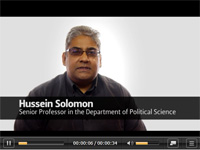Latest News Archive
Please select Category, Year, and then Month to display items
02 July 2019
|
Story Eloise Calitz
|
Photo Keagan Nkwaira
 Audience members listening attentively to the presentations at the Entrepreneurship Inter-varsity on the Bloemfontein Campus.
Audience members listening attentively to the presentations at the Entrepreneurship Inter-varsity on the Bloemfontein Campus.
The UFS continuously creates opportunities for students to develop and explore platforms where they can showcase their talents and share their innovative concepts. In the light of this, it is important for the institution to become a preferred academic knowledge partner that can conceptualise, develop, and successfully commercialise research activities, and through this foster an innovative and entrepreneurial culture that aligns to its Integrated Transformation Plan.
This is why opportunities such as the Entrepreneurship Intervarsity Competition are so important, since it encourages students to demonstrate their entrepreneurial talent, and through this connect with investors and industry leaders to start up a business.
The competition
Student entrepreneurs across the 26 public universities in South Africa were invited to submit their innovative ideas as part of a competition supported by Entrepreneurship Development in Higher Education (EDHE), in collaboration with the Allan Gray Orbis Foundation. The opportunities created through this initiative are twofold:
1. For student entrepreneurs to present their innovative ideas and businesses.
2. For universities to demonstrate their entrepreneurial talent and the ways in which they support and grow the next generation of business leaders.
The competition takes place in five stages. The process started with each student submitting their short videos and applications on the official competition site. Each institution also had the opportunity to select student entrepreneurs to take part in the competition. Fifteen students pitched their ideas during internal rounds at the UFS on 30 May 2019. Of these students, four were selected to represent the UFS at the regional rounds of the Entrepreneurship Intervarsity, where the finalists will be chosen.
The students were judged in four categories:
• Category 1: Innovative Ideas
• Category 2: Tech Businesses (existing businesses, formal or informal, undergrad or postgrad)
• Category 3: Social Impact Businesses (existing businesses, formal or informal, undergrad or postgrad)
• Category 4: General (existing businesses, formal or informal, undergrad or postgrad)
The following UFS entrants were selected to take part in the regional finals:
• Christopher Rothman for his liquid yeast culture that can be used in the fermentation of beer.
• Driaan-Lou Kemp for his patented water-saving device.
• Grace Mthembu for her electricity-saving system.
• Martin Clarke for his idea to use drone technology for the mining industry
Islam. Boko Haram. Terrorism. Prof Hussein Solomon offers insight.
2014-09-04
 Photo: en.wikipedia.org |
Prof Hussein Solomon introduction: video

When it comes to politics, there are lots of negative talk, but without any action or solutions.
However, with Prof Hussein Solomon, Senior Professor at the UFS’s Department of Political Science, there is not a lot of talk without solutions, but great activity regarding research work published on Islam, the Middle East, Boko Haram and environmental issues in Africa.
Prof Solomon’s most recently published article, Five Lessons Learned from Ejecting Islamists in Mali, was published in the Research on Islam and Muslims in Africa (RIMA) Policy Papers on 1 September 2014.
(https://muslimsinafrica.wordpress.com/2014/09/01/five-lessons-learned-from-ejecting-islamists-in-mali-professor-hussein-solomon/ ).
“The terrorist threat is mounting with each passing day in Africa with Islamist terror groups exploiting the ungoverned spaces, the availability of weapons, porous borders, an incompetent security apparatus and corruption in the political establishment,” Prof Solomon writes in this paper.
“It is therefore important, to explore cases where attempts have been made to dislodge the Islamists with a view to learn lessons so that future interventions do not repeat the failures of the past. This paper explores the intervention and lessons which could be learned from French and Economic Community of West African States (ECOWAS) attempts to oust Islamists in northern Mali in 2013.”
Prof Solomon holds a DLitt et Phil (Political Science) from the University of South Africa (UNISA). In 2011, he was Visiting Professor at the Osaka School for International Public Policy (OSIPP). In 2007 and 2010 he was Visiting Professor at the Global Collaboration Centre at Osaka University in Japan and in 2008 he was Nelson Mandela Chair of African Studies at Jawahrlal Nehru University in New Delhi, India. In 1994, he was Senior Visiting Fellow at the Department of War Studies, King’s College at the University of London. He is currently a Visiting Fellow at the MacKinder Programme for the Study of Long-Wave Events at the London School of Economics and Political Science in the United Kingdom.
He is also a Senior Associate for the Israeli-based think tank Research on Islam and Muslim in Africa and a Senior Analyst for WikiStrat.
More articles by Prof Solomon:
Boko Haram and the case of the abducted school girls
http://muslimsinafrica.wordpress.com/2014/05/14/reinvigorating-the-fight-against-boko-haram-professor-hussein-solomon/
Australian Broadcasting Corporation interview on Boko Haram
http://www.abc.net.au/radionational/programs/counterpoint/boko-haram/5657882
Reflections on Inga 3 and Beyond
www.saccps.blogspot.com
Nile and Okavanga River Basins (pdf)
Nigeria’s Boko Haram: Beyond the rhetoric (pdf)